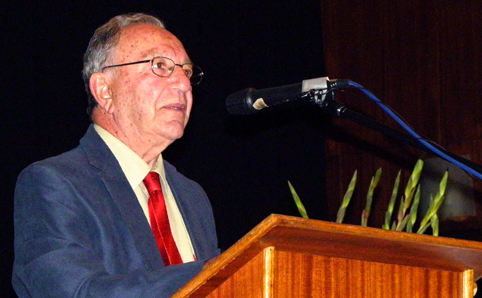 |
|
Prof. Benjamin Turok speaking about the Evolution of Economic Policy Thinking.
Photo: Henco Myburgh
|
The African National Congress (ANC) government is faced with the dilemma of an inherited distorted economy. Subsequently South Africa has the most unequal society in the world. That is according to Prof. Benjamin Turok, head of Political Education for the ANC in Parliament. Prof. Turok spoke at an ANC Centenary Dialogue at the Bloemfontein Campus of the University of the Free State (UFS) on 23 November 2011.
Delivering the last lecture of the year in a series of dialogues about the ANC, Prof. Turok said it was hard to swallow that after 100 years there is still inequality. This for a party whose essence is the notion of sharing, as set out in the Freedom Charter. Prof. Turok told the audience in a packed Odeion Theatre that the ANC Centenary provided a moment of reflection. “If we neglect the poor and uneducated and do not interfere and direct investment, we will always have inequality.”
Talking about youth unemployment, Prof. Turok said that no society can live in peace if young people are not employed. He said that he welcomed the energy the ANC Youth League has put in economic policy, but would like to see a youth league economic policy that is scientific.
The ANC Centenary Dialogue series has been hosted by the Centre for Africa Studies and will continue on 15 February 2012.